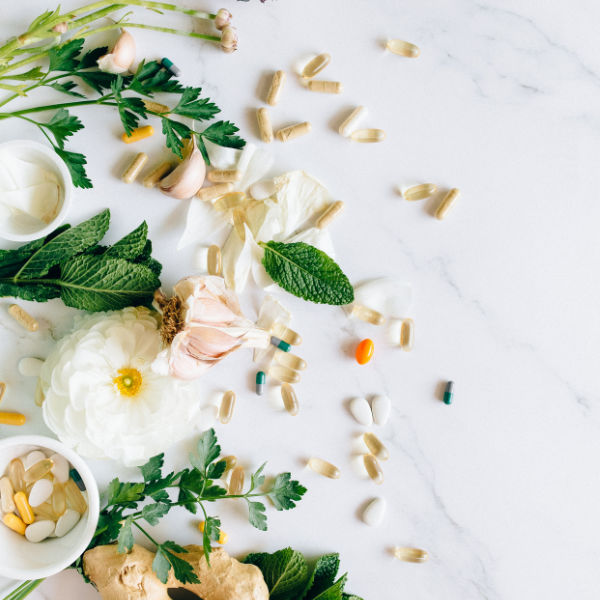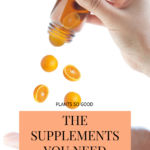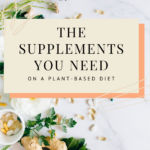In this post, you’ll learn all about the supplements you need on a plant-based diet. If you’re looking for solid actionable information without the fluff, all in one place, this post is for you!
A plant-based diet offers amazing health benefits. While the specifics of what that diet might look like can vary widely, we’ve seen over and over again that the healthiest diets are those that prioritize whole plant foods. 2, 3, 4.
Like any diet though, a plant-based diet requires a special focus on certain nutrients. While we can get most of the nutrients we need daily from whole plant foods, there are a few that should be supplemented (with either synthetic or whole food supplements) to round out your diet and provide a safety net.
Before we get into the supplements you need on a plant-based diet, however, we need to rewind for a sec and discuss the supplement industry in general. Trust me, you’ll want to know this information before you buy any supplements.
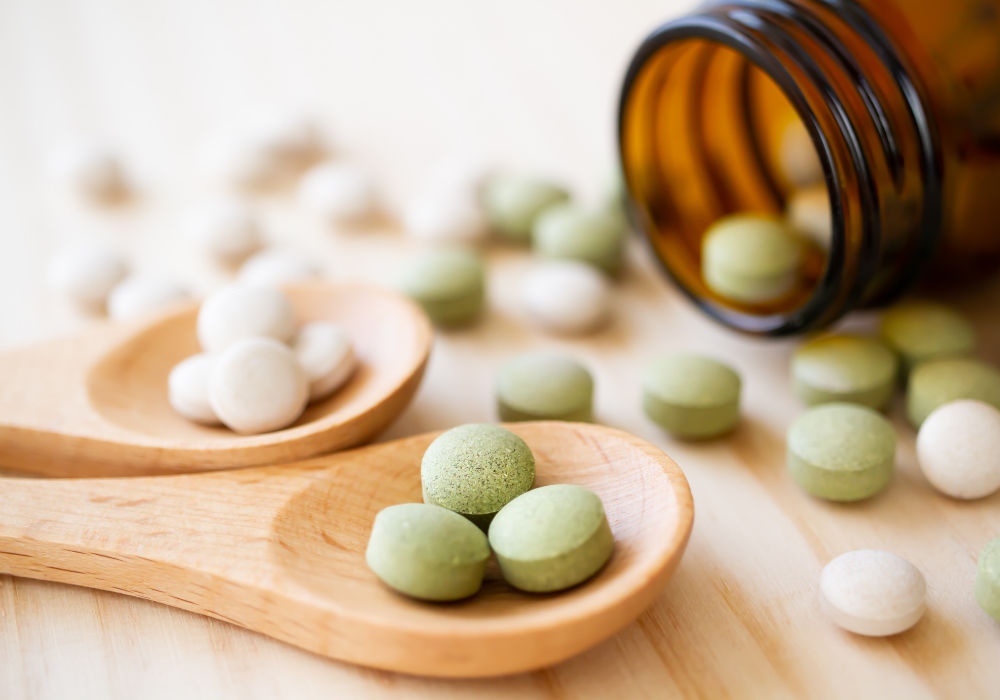
The supplement industry’s got problems
The lack of regulation in the supplement industry is disturbing, to put it mildly. I was shocked to learn that at least one-fourth of the supplements on the market today do not contain the amount of or even the ingredient that they claim. We know this as fact because there have been third-party studies done testing products from a wide variety of common supplement brands.
What they found was that 1 in every 4 supplements has a quality problem.
Either it doesn’t contain what it says it contains, is super low quality and therefore ineffective, or contains harmful compounds (think heavy metals). 1
Due to this complete lack of regulation in the supplement industry, there are two things we can, and should, do.
First, our best defense against deregulation is to avoid the issue as much as possible. That means focusing on foods first. By making it a goal to get as many nutrients as possible from the food we eat every day, we minimize the supplements we need to take. This means we can minimize our exposure to the problems in the industry in the first place.
Second, when it comes to the few supplements we do need to take (we’ll get there in a minute, I promise), we (the individuals) need to take our health into our own hands and educate ourselves so we can make informed decisions. If keeping our bodies and minds healthy at a holistic level is the goal (which, since you’re here reading this, I’m guessing it is!), learning about supplements, what to look for, what to watch out for, and what we need to supplement on a plant-based diet is the key.
So how can we ensure the supplements we take actually contain what they say they do, are high quality and effective, and don’t contain contaminants?
Despite what it may seem given everything you just learned, there actually are good supplement companies out there making high-quality products. You just need to know what to look for.
Thankfully, I’ve got you covered! Keep reading to learn my top three tips to identify high-quality supplements.
How to ensure you’re getting the supplements you’re paying for
Third-party testing
Don’t buy a supplement that doesn’t scream and shout about their third-party testing. Usually, brands will make it 100% clear, front and center, that they have 3rd party testing done on their supplements, so you shouldn’t need to look hard. They want you to know because it’s unusual in the industry! If a company doesn’t have third-party testing info on its website, consider buying from another brand. At the very least, reach out to the company and ask to see third-party test results. If they don’t want to share them with you (or don’t have any), that’s your cue to run the other way.
Purchase from a reputable company
No track record = a big no when it comes to supplements. If you’re just getting into supplements and don’t know of any reputable companies that have strict third-party testing procedures, ask your favorite nutritionists or dieticians for brand recommendations. And no, your random friend who takes a bunch of supplements does not count.
Once you find a high-quality supplement company, stick to them. Don’t waste your money or health trying shiny new products you see on Instagram. Tried and tested is the way to go. This is true for a lot of things, but even more so when it comes to supplements.
You get what you pay for
Effective supplements will cost you more than subpar options, there’s really no getting around that. While prices vary widely between brands, you really do get what you pay for (as long as you keep in mind the first two strategies above). That $6 bottle of turmeric capsules from CVS? Tempting, I know, but it’s honestly not worth the money.
The most cost-effective strategy you can take is to 1) take a food-first approach and 2) take a minimalist approach to supplements. Buy the few supplements you need at the best quality you can find. Instead of 6 different supplements that are each $10, opt for 2 or 3 supplements that are $20 to $30.
Now that you’re clear on how to find supplements worth taking, let’s move on to the real reason you’re reading this.
The Supplements You Need on a Plant-Based Diet
When you think about supplements, little pills in bottles probably come to mind. Or perhaps a powder in a bag or jar. When I think about supplements, two groups come to mind: synthetic supplements (what most people think of as supplements) and whole-food supplements.

There are certain foods so high in specific nutrients that we can treat them as supplements. Just one or two Brazil nuts, for example, more than covers your selenium needs for the day! Why would you take a synthetic supplement from a jar when you can pop a nut into your mouth instead and get your nutrients in a whole-food package? Not only is the whole food option tastier, but it’s significantly cheaper as well!
So let’s talk about the synthetic and whole food supplements you need on a plant-based diet. These are the basic supplements I take and recommend to people consuming a diet in which 75% or more of your calories are coming from plants. I’ve linked some of the specific products I take below, but know that there are many options out there to meet your supplement needs. As long as you follow the criteria we discussed at the top of this post, you should be able to find an option that works for your body and budget.
**A quick note that you should always check with your doctor before starting a new supplement regime. This is especially important for people with health issues and those taking medications, as certain supplements can interact with pharmaceuticals.
Synthetic supplements to take on a plant-based diet
Synthetic supplements are isolated nutrients that come in tablet, capsule, liquid, or gummy form. They can either be synthetically made (more common) or extracted from foods (less common). A synthetic supplement can be a single nutrient (like B12) or a combination of different isolated nutrients (like a multivitamin or a B complex supplement).
If you’re going really minimalist, there’s only one supplement that I consider “required” for anyone eating a plant-based diet.
That supplement is vitamin B12. I wrote a detailed article all about B12–what it is, where it comes from, why we need it, and why we need to supplement it on a plant-based diet, so I won’t go into all those details here. Check out this post if you’re interested in diving deeper into vitamin B12.
For dosage, I recommend a sublingual or a liquid spray B12 supplement of 250-500 mcg daily, or a once-weekly dose of 2500 mcg. B12 absorbs best through the mouth (as opposed to the stomach), so something that dissolves in your mouth is a better option than a tablet or capsule. This is the B12 supplement I currently take, which is sublingual and has an inoffensive berry flavor.
Aside from B12, there are two other synthetic supplements that can be good insurance policies for plant-based eaters:
- Vitamin D3
- Omega-3 fatty acid
Supplementing with vitamin D3
We get vitamin D from the sun (technically, our body creates it when our skin is exposed to sunlight), but it’s 2022 and if you’re reading this you probably work indoors all day. Maybe you get outside for a fifteen-minute walk once a day. Unfortunately, innovation is much faster than evolution and our bodies still need a lot of sunlight every day to create the amount of vitamin D we need. And no, walking around your block with long sleeves and pants on in the winter doesn’t count.
People with lighter skin need at least 20 minutes of direct sunlight on the skin to get sufficient vitamin D. Darker-skinned people need more than that. The more melanin in your skin, the better your body is at protecting your skin from sunburn. That also means the longer you need to spend in the sun to create sufficient vitamin D. This advice isn’t just for plant-eaters though.
No matter the diet you follow, it’s likely you should supplement with vitamin D, given that 50% of people in the US are deficient. That already super high number jumps to a crazy high percentage if we look at darker-skinned Americans specifically (up to 70%!). 5, 6.
For adults 18-70 years old, I suggest a dosage of 1000 IU (25 mcg) liquid Vitamin D3 supplement. Older adults need more vitamin D due to the increased loss of bone density, so aim for 2000 IU (50 mcg) daily.
Two final notes on vitamin D. Vitamin D is a fat-soluble vitamin, which means it needs to be eaten with a source of fat to absorb into the body. Because of this, I recommend a liquid D3 spray or drop supplement that has an oil base.
My final tip here is to look for a plant-based D3 supplement made from lichen. The majority of Vitamin D supplements are animal-derived, so be sure to check the ingredients before buying any supplements. Studies show lichen-based D3 supplements are just as effective as animal-derived options, so you won’t be sacrificing any benefits by opting for the plant-based version.
This is the vitamin D3 supplement I currently take, which has sunflower, pumpkin seed, and vitamin E oils to help absorb the vitamin D. I like it because it’s sourced from lichen, tastes good, and is easy to take–just one spray per day gives me the 1000 IU of vitamin D3 I need.
Supplementing with omega-3 fatty acids
Onto omega-3s! As I mentioned earlier, supplementing with omega-3 is a good insurance policy for people following a plant-based diet. Ideally, we would get our omega-3 fatty acids from foods, which is what I personally do, but that’s not always possible for everyone. We’ll discuss a whole food way of getting those omega-3s without taking a synthetic supplement below. If for whatever reason the whole food version isn’t an option for you though, (if you’re allergic to flaxseeds and walnuts, for example) then supplementing with a synthetic omega-3 is definitely the way to go.
There are three main types of omega-3s: ALA, DHA, and EPA. ALA is found in plant foods while DHA and EPA are mostly animal-based, with a few plant-based exceptions. Our body doesn’t actually use ALA but rather converts it to DHA or EPA. This is a natural process in the body but it’s an inefficient one.
Our bodies need a lot of ALA to convert it into enough DHA and EPA, hence why this is a nutrient of focus for plant-eaters.
If you follow a plant-based diet like me, it’s important to understand this because you’re going to want to give special attention to omega-3s in your diet and include either a synthetic supplement or a whole food supplement in your diet daily.
For synthetic omega-3 supplementation, look for an algal oil-based supplement. Algae is one of the few plant-based foods rich in DHA and EPA, and the only plant-based omega-3 supplement I recommend.
I personally do not take a synthetic omega-3 supplement (I explain what I take instead below), but here’s a high-quality soft gel option, and here’s a liquid spray option. Both are algal oil-based.
That’s it for the synthetic supplements I suggest for those of you following a plant-based diet. Simple enough, right?
Now let’s move on to the whole foods that are worth treating like supplements that I suggest incorporating into your daily diet.
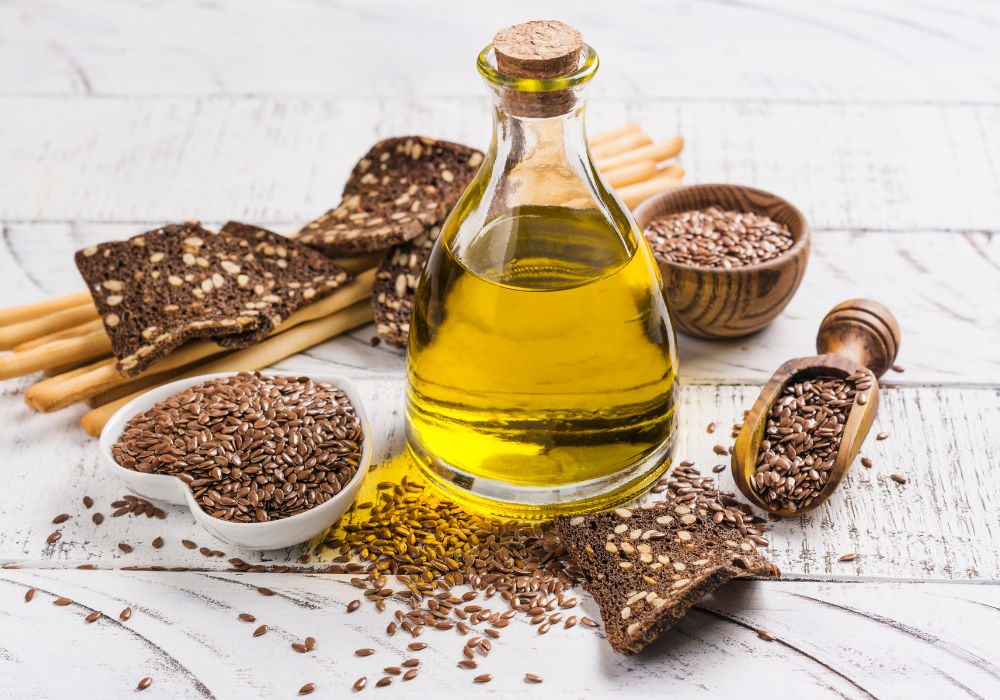
Whole food supplements on a plant-based diet
On a plant-based diet (on any diet), we can gain a lot by shifting our thinking. Instead of thinking of supplements as exclusively coming out of a pill bottle, we can treat certain foods that are particularly high in desired nutrients like a vitamin. This mindset shift serves us in three ways.
- We save money (because whole foods are much cheaper than synthetic supplements)
- We get not only the desired nutrient but a whole host of other beneficial nutrients that come along for the ride
- Real food just tastes better than popping pills!
Here are the whole food supplements I eat daily and suggest you consider incorporating into your diet:
- 1-2 Brazil nuts – Brazil nuts are the best food source of selenium! You only need 1-2 per day to reach the recommended amount of selenium we need each day!
- 2-3 tablespoons of chia seeds, walnuts, and/or ground flaxseeds – Walnuts, chia, and flaxseeds are all great sources of omega-3 ALA, which, as you learned above, our bodies convert to DHA and EPA to use. If you’re getting your omega-3s from whole foods, aim for 5g of ALA per day, which is about two to three tablespoons of one or all of these nuts/seeds. Remember to eat ground flaxseeds, not whole, as our digestive systems can’t break down the seeds and they’ll just go through your digestive system unabsorbed.
- Iodized salt in your cooking – While there are other options for getting iodine on a plant-based diet, like seaweed, iodized salt is easy and inexpensive. We only need ⅓ teaspoon of iodized salt per day to hit our iodine requirements, so this one is really easy to do. Try to get an iodized sea salt without anticaking agents, not table salt, which has been bleached and all the minerals extracted.
Ideas to make taking your supplements easy
Now you know about all the supplements I recommend taking on a plant-based diet. But you might be feeling a little overwhelmed, wondering how you’re going to remember what to take and when. Not to worry, I’ve got tips to help you with this too!
Thinking of whole foods supplements as supplements and remembering to take them just like your synthetic supplements might take some getting used to.
Here are a few tips to help you remember to take those whole food (and synthetic) supplements.
- Put a little dish out for each person at breakfast with 1-2 Brazil nuts, 1 B12 pill, your D3 spray, and omega 3 supplement if you’re taking it
- Drink a smoothie as a midmorning snack and put a spoonful of ground flaxseeds in it per person
- Cook with iodized salt
- Attach taking your supplements to another routine you already have down, such as eating breakfast. Research shows that lumping a new habit you’re trying to form with one you already have down will give you a better chance of adopting that new habit successfully.
So there you have it, everything you ever wanted to know about supplements on a plant-based diet, and then some! There are so many supplements out there, and so much confusing information about what we need to be taking for optimal health. I hope this information helps you clear the confusion, reach new levels of health, and stay that way long-term.
Feel free to reach out to me on Instagram if you have any questions about supplements on a plant-based diet. I’m always happy to help!
References:
- Supplement Labeling Fraud Is Widespread. NutritionFacts.org website. https://nutritionfacts.org/2020/02/27/supplement-labeling-fraud-is-widespread/
- New study reveals that healthy plant-based diets are associated with a lower risk of developing diabetes. Science Daily website. https://www.sciencedaily.com/releases/2022/04/220410110753.htm
- Nutritional Update for Physicians: Plant-Based Diets. National Library of Medicine. https://www.ncbi.nlm.nih.gov/pmc/articles/PMC3662288/
- Plant-Based Diets & Their Impact on Health, Sustainability, and the Environment. WHO. https://apps.who.int/iris/bitstream/handle/10665/349086/WHO-EURO-2021-4007-43766-61591-eng.pdf?sequence=1&isAllowed=y
- Vitamin D and African Americans. The Journal of Nutrition. https://doi.org/10.1093/jn/136.4.1126
- Racial/ethnic considerations in making recommendations for vitamin D for adult and elderly men and women. The American Journal of Clinical Nutrition. https://doi.org/10.1093/ajcn/80.6.1763S
